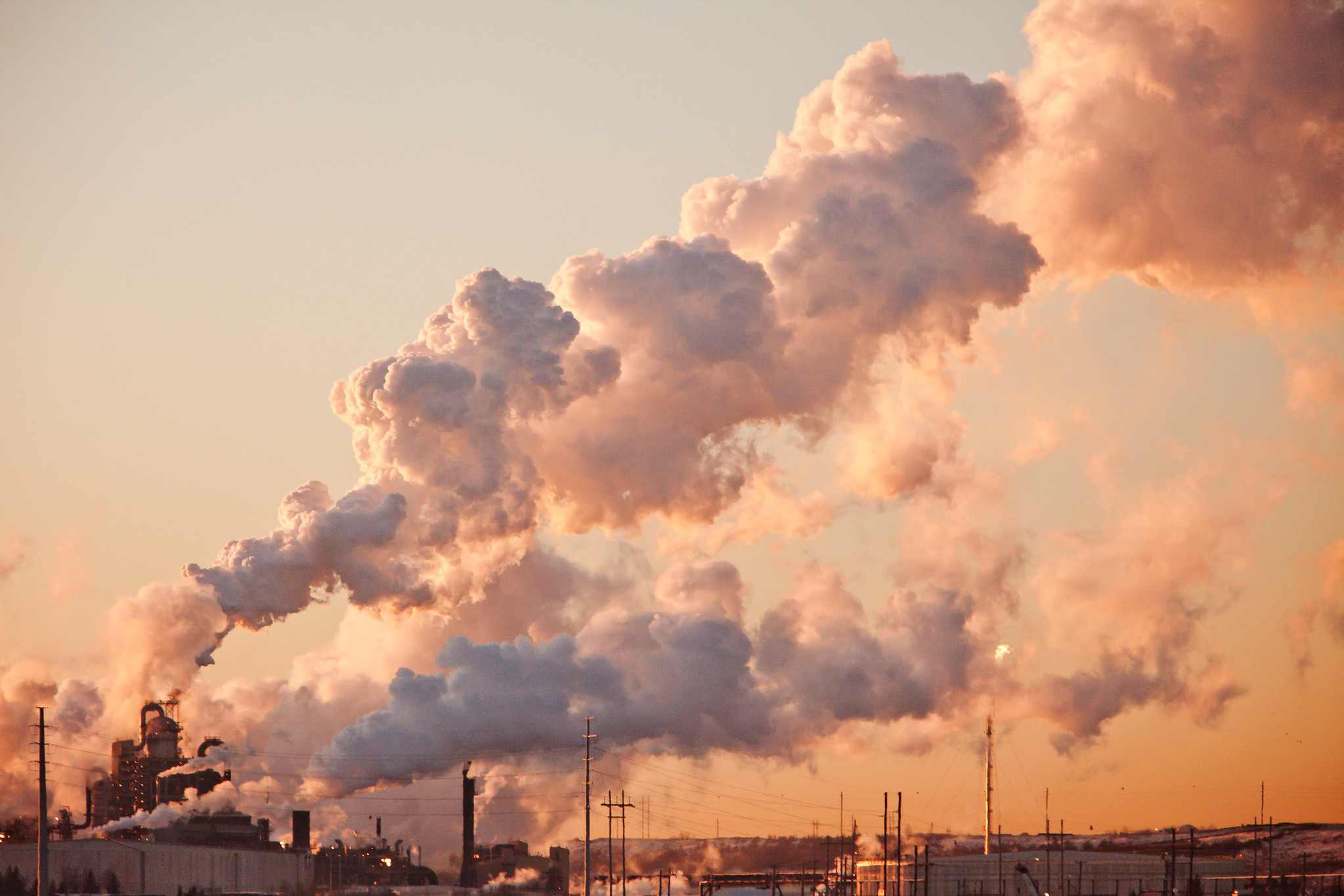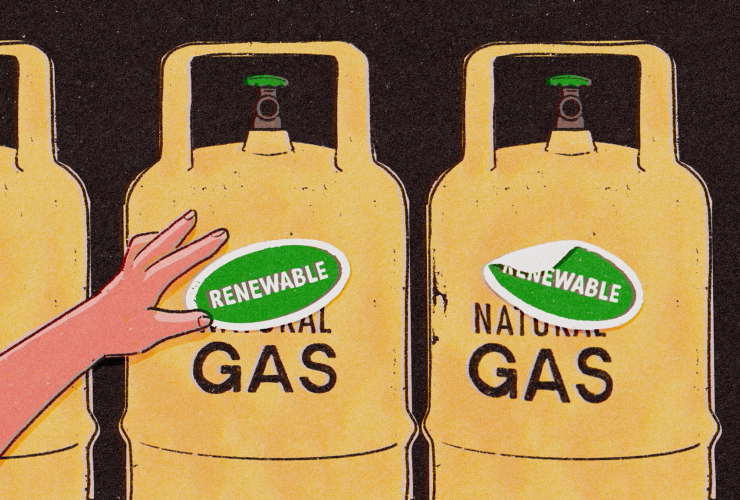The federal government provided at least $18.5 billion to the fossil fuel and petrochemical industries last year, according to a new report by Environmental Defence.
The largest single subsidy was to Trans Mountain, which benefited from $8 billion in loan guarantees to try to get its nearly completed $35-billion pipeline expansion project to the finish line.
Crown corporation Export Development Canada provided another $7.34 billion in public financing, including $200 million for Enbridge and $300 million for NOVA Chemicals.
Environmental Defence produces an annual report tallying up the federal government’s financial support to the oil and gas industry, which in 2022 amounted to at least $20.2 billion. This includes direct grants, tax breaks, loans and loan guarantees from the federal government and its Crown corporations.
The 2023 tally was down a little but “clearly shows that the steps the federal government has taken are not enough,” said Julia Levin, associate director of national climate for Environmental Defence and author of the report. Over the last four years, the federal government's total financial support to the oil and gas industry was at least $65 billion, according to the analysis.
“Really, we need to go after the lion's share of the support that goes to the fossil fuel industry. And that means ending all public financing,” said Levin.
In December 2022, Energy and Natural Resources Minister Jonathan Wilkinson announced a plan to end public financing for unabated fossil fuel projects abroad, with some exceptions. The move was hailed as a milestone by many environmental groups.
“At least 80 per cent of [Export Development Canada’s] financing is domestic rather than international,” said Levin. “A lack of transparency and public reporting” makes it hard to track all the subsidies, she added. A federal framework to phase out domestic subsidies is expected this fall.
This year, Environmental Defence’s analysis includes some financial support to the petrochemical industry because Export Development Canada changed how it reports transactions and included some petrochemical companies in the oil and gas category, explained Levin. Petrochemicals are derivatives of fossil fuels and are used to manufacture many different products, including plastics.
“We know that the petrochemical industry is Plan B for the oil and gas sector and we are seeing more and more petrochemical projects pop up across Canada and seek substantial government supports,” said Levin.
Alberta launched a 10-year grant program for petrochemical projects in 2020. So far, the program has awarded $408 million to Inter Pipeline Ltd.’s plastics facility, $161 million for Air Products’ natural gas to hydrogen production facility and $32 million to support Dow Canada’s expansion of its ethylene production facility.
The report also highlights over $1.3 billion for carbon capture and storage projects, largely funded by the Canada Growth Fund. Carbon capture, utilization and storage is the centrepiece of the oil and gas industry’s decarbonization plan, but the technology is widely criticized by environmentalists for its high cost and ability to lock in fossil fuel production. The technology captures emissions created during oil and gas production but does not address the majority of oil and gas emissions, which are produced when these products are burned.
Carbon capture subsidies are expected to increase in 2024 once the federal government’s carbon capture investment tax credit is approved, the report noted. Companies can retroactively claim expenses from 2022 for eligible projects. The Office of the Parliamentary Budget Officer estimates the tax credit will cost $5.7 billion from now until 2028.
At a fossil fuel panel last week, MPs from all parties except the Conservative Party of Canada discussed the need to end fossil fuel subsidies.
While Bloc Québécois MP Monqiue Pauzé, NDP MP Laurel Collins and Green MP Mike Morrice called carbon capture a false solution that should not be subsidized with taxpayer dollars, Liberal MP Leah Taylor Roy defended her government’s support for the technology.
“The carbon capture program, which is meant to reduce emissions, is not just applied, obviously, to the oil and gas sector. It applies to all sectors across Canada,” said Taylor Roy.
“So we are working on eliminating the subsidies but there are some exceptions that have been made to ensure that we can fight climate change now because production will not end, it is not within our control,” she said.
“We have stringent caps on emissions, but the provinces control production. We do not. So we're doing what we can to ensure that while oil and gas is still being produced that it is being produced in the best way possible and working to phase out through our cap on emissions.”
Last summer, the federal government announced a set of guidelines to end inefficient subsidies to the fossil fuel sector. The fossil fuel subsidy framework only applies to federal tax measures and departmental spending and programs, not the Crown corporations responsible for the bulk of public financing. Environmental organizations including Environmental Defence and Above Ground want the federal government to simply expand the financing rules for international projects so they apply to funding for projects located in Canada.
According to Statistics Canada’s most recent data, oil and gas extraction companies in Canada made $63 billion in profits in 2022.
“We should absolutely be putting a windfall profit tax on their excess profits, which this government has already done when it comes to banks and life insurance companies,” said Morrice at the cross-party panel on March 21. In Budget 2022, the federal government introduced a one-time 15 per cent windfall tax on banks and insurance companies’ excess profits made during 2020 and 2021.
“Along with the NDP and the Bloc Québécois, Greens have been calling to simply apply that same measure to oil and gas,” said Morrice. “If they did so, we could generate $4.2 billion to invest in proven climate solutions, like the Greener Homes Grants that currently folks in Ontario can no longer apply for.”
Such a policy appears to be popular with Canadians — a Leger poll from early March showed 62 per cent of Canadians want the federal government to tax oil and gas companies’ excess profits. Environmental groups are urging Finance Minister Chrystia Freeland to include a windfall tax in Budget 2024, which will be tabled on April 16. The federal government should also take this opportunity to communicate what it is doing to meet its fall 2024 deadline to produce a plan to address domestic fossil financing, said Levin.
“We really do need an update on the process,” said Levin, adding that Environment and Climate Change Canada is developing this policy. “My concern there is we've heard nothing publicly.”
The $65 billion in financial support to the oil and gas sector could have fully funded every major wind and solar project in Canada from 2019 to 2021 12 times over, according to the Environmental Defence report. The just over $18.5 billion recorded this year could have trained 37,000 new community-based firefighters, based on the Canadian Association of Fire Chiefs’ request for $500 million to train a thousand new firefighters.
Natasha Bulowski / Local Journalism Initiative / Canada’s National Observer
Let's break these extractive
Let's break these extractive industry subsidies down to per capita amounts. That tactic was used in the Netherlands to galvanize public opinion against fossil fuel/petrochemical subsidies. The shock of the per capita amounts also generated massive public protests drawing thousands of people and forced the government to vote to stop the subsidies. Canada has a tiny population and these are massive subsidies, time to stop the money pipeline!
$18.5 billion divided by 40
$18.5 billion divided by 40 million works out to $462.50 for every Canadian last year alone.
That kind of money could easily add up to $200B over a decade. Wow!
How many heat pumps would that buy? Or fully integrated fast, frequent transit systems in the top 10 cities? Or hospitals and schools? Or smart grid transmission corridors?
OK, readers, let's have some fun with your 10 digit calculators....
While still working in round
While still working in round numbers, narrowing the field to citizens aged 18 and up (primary tax paying years) would reduce the primary body of taxpayers to ~30 million.
Extending last year's fossil subsidy over 10 years would result in a cost of $6,167 per taxpayer since 2014. My guess, the actual cost is higher.
I agree with Suzanne. (per
I agree with Suzanne. (per capita (taxpayer))
We have to flip the script away from the silly populist dogwhistling over the price of gasoline. First in average cost context, a liter of milk is $2.91, a liter of bottle water $1.75, a liter of gasoline $1.83. In the shell-game of the distribution of tax revenue my bet is, the small percentage of a carbon tax on gasoline is likely miniscule compared to our overall shared fossil fuel subsidy. It should not be 'axe the tax' but 'who's booming who'!
https://www.globalpetrolprices.com/gasoline_prices/
https://www.indexbox.io/search/bottled-water-price-canada/
https://www150.statcan.gc.ca/t1/tbl1/en/tv.action?pid=1810024501
It would appear that the only
It would appear that the only way to end subsidizing the Oil and Gas sector is to make it no longer profitable.
That in its self is a dream in which we would have to be 100% EV and all our homes to be on Heat Pumps and electric heat.
So lets not forget that we are still needing Oil for plastic manufacturing and other industries, Canadian LNG and Methane are now wanted to help countries over seas get off coal and oil heat. We have to reduce at a constant and measurable level to make our 2050 goal.
We can help the planet reduce GHG but it takes the whole world to make the changes needed.
It would appear that the only
It would appear that the only way to end subsidizing the Oil and Gas sector is to make it no longer profitable.
That in its self is a dream in which we would have to be 100% EV and all our homes to be on Heat Pumps and electric heat.
So lets not forget that we are still needing Oil for plastic manufacturing and other industries, Canadian LNG and Methane are now wanted to help countries over seas get off coal and oil heat. We have to reduce at a constant and measurable level to make our 2050 goal.
We can help the planet reduce GHG but it takes the whole world to make the changes needed.







Comments